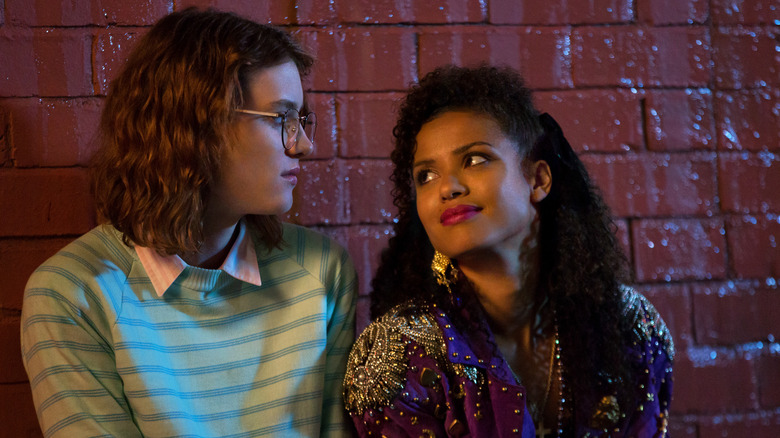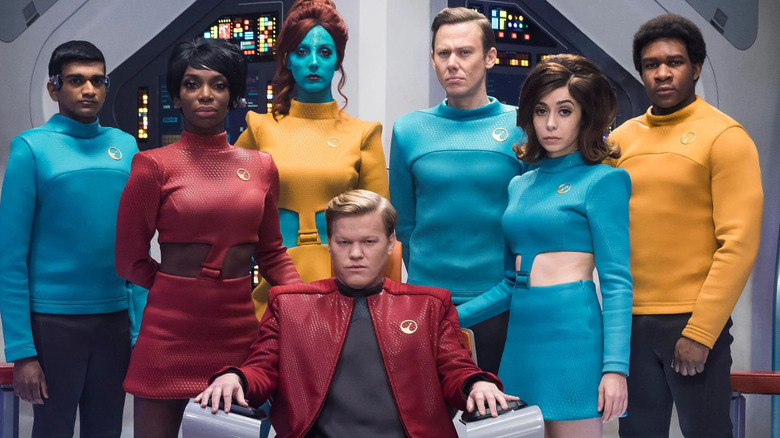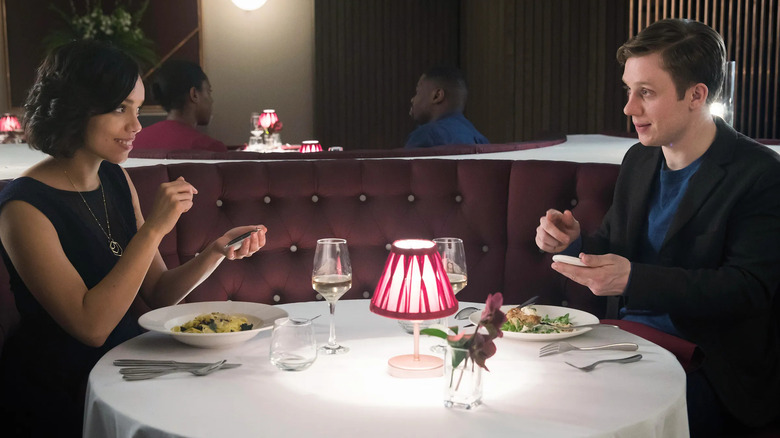Black Mirror's Creators See An Overarching Optimism In Their Show
"Black Mirror" has a reputation for being cynical. Its very first episode centers around the UK's Prime Minister being forced to have sex with a pig, while the country's citizens watch for entertainment on their TVs. The second episode centers around a character who passionately tries to fight back against the corrupt entertainment system, only to immediately fold on his values the moment they give him money and his own TV show. The third episode centers around a man who's paranoid that his wife has cheated on him, and he turns out to be right. The show only gets darker from there.
As a result, the show's also known for being a little fearmonger-y about technology, with its social commentary often being reduced to "phones bad" in public discourse. That "wat if ya mum ran on batteries" meme making fun of the show took on a whole life of its own for a couple of years there, made worse with that season 5 episode where Andrew Scott's character went on a whole rant about how people are too addicted to their phones.
Despite that, the show's creators aren't actually as scared about technology as you might think. If anything, they describe themselves as "quite optimistic." Co-creator Annabel Jones pointed out in a 2019 interview that social media has given regular people more of a platform than they've ever had. "All these people suddenly have a voice," she said. "They're a commercial body who will bring about change from the capitalists who are doing damage to the environment." Although they're aware of the potential downsides to social media (see: half the show's episodes), they don't seem to think it's a net negative. They seem willing to hope that the worst aspects of the internet aren't necessarily permanent problems.
Exploring periods of transition
When it comes to the dark side of social media, Brooker compares it to what he assumes things were like back when printing presses were first invented. "Back in the day, they probably disseminated ideas that were idiosyncratic and inflammatory. There would've been all sorts of disruption," he said. "You would hope, long term, we're going through a transitional period and we just happen to be in the middle of it."
You can see this idea reflected constantly throughout the show, in which the new technology has clear upsides for society. The memory-capturing technology in "Crocodile," for instance, seems like a genuinely helpful invention, one with clear overall benefits for society. Even the power to insert someone's consciousness into a computer is a potentially great idea, assuming you use the technology in the right way. When used with good intentions, the same technology that led to the heartwarming "San Junipero" can be used for the acts of unspeakable cruelty shown in "White Christmas" or "Black Museum."
And when the downsides of this technology is discovered, the people in "Black Mirror" often pick up on this and change things. The main character in "The Entire History of You" cuts out the "grain" that lets him record all his memories. Some of the more disturbing technologies shown in "Black Museum" are mentioned to have long been outlawed by the government. The show tends to focus on transitional periods around new technology, moments right after society has embraced the new thing, but before they've fully realized all its downsides. The events of "Crocodile" will probably lead to some changes in the way the Recaller technology is used, for one example.
A nicer show than you'd think
Even beyond the way technology is portrayed, "Black Mirror" is often a kinder show than it gets credit for. Yes, mean things happen to its characters all the time, but the show rarely asks us to revel in their suffering. Two of the most pessimistic episodes of the show, "White Bear" and "Shut Up and Dance," both revolve around major twists that reveal terrible truths about their main characters. Both Victoria (Lenora Crichlow) and Kenny (Alex Lawther) did some genuinely terrible things that most people would agree deserves some sort of punishment, but the show itself refuses to let you take joy in their comeuppance.
"Black Mirror" asks you to have empathy for people who you probably wouldn't feel bad for at all if you'd read about their story on the news. It creates a far more uncomfortable viewing experience than shows that triumphantly, uncritically take down the bad guys at the end, but it's what makes "Black Mirror" far more thoughtful than a typical TV show. The worlds presented in these episodes are often deeply cruel to its main characters, but the show's perspective isn't.
The show has gotten some flack over the past few seasons for having lost its edge, especially since season 5 had the audacity to step away from the downer endings the show used to be famous for. But while the outcomes of the storylines have changed, the show's worldview hasn't. "Black Mirror" has always argued in favor of the idea that everybody, no matter how what crime they've committed, should be treated with at least a basic level of human dignity. It's not just that the writers of "Black Mirror" think things can improve; it's that they truly believe we deserve better.


